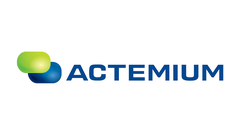Actemium Chair - Sustainable Energy
INTRODUCTION
The production process in most industrial sectors, in addition to the availability of the necessary machinery, raw materials and people, often requires a significant amount of energy, in either electrical, thermal or chemical form, to be available at the right time at the right place in the process. Whereas previously a continuous and stable supply at low cost of gas or electricity through the grid was previously taken for granted, high energy prices and climate considerations now force companies to provide infrastructure for the sustainable generation, conversion and storage of energy on the company site itself. But, although wind turbines and solar panels, for example, are sustainable sources of cheap energy, their output is subject to weather conditions and thus highly variable. Moreover, one must also take into account the limited possibilities for thermal or electrical energy storage and unavoidable conversion losses. These aspects present the necessary energy transition facing companies as a complex optimisation issue: what investments should be made and how do we realistically estimate payback periods? But at the operational level, the additional degrees of freedom in daily production planning are also a challenge. Because of the variability and limited predictability of energy supply, careful planning of when and with which energy source production happens can be a significant gain.
OBJECTIVES
Actemium is a B2B integrator that designs and builds solutions for industrial customers. It is aware of the increasing importance of a flexible and sustainable energy infrastructure at the customer's premises, together with efficient production planning that explicitly accounts for the energy state (bill of energy). By offering the Actemium - Sustainable Energy chair, they aim to promote academic research on energy-aware optimisation models, in particular the development of advanced models and smart solution techniques for the design, optimisation and simulation of sustainable production systems.
Sustainable production systems use their input resources in an efficient way: low material waste, optimised energy consumption, good working conditions for staff, and to some extent resistant to unexpected interruptions. Sustainability can be increased, for example, through advanced planning software that takes into account data from multiple business units and helps support coordinated decisions. Attention will be paid to validating the research via use cases from different production systems within Actemium.
SPONSOR
PERIOD
2022-2026
PROMOTOR
Prof El-Houssaine Aghezzaf is chairman of the Department of Industrial Systems and Product Design, Faculty of Engineering and Architecture, Ghent University. His expertise is in stochastic modelling and optimisation of industrial systems, with applications in manufacturing systems, inventory management and logistics networks. He teaches courses on models and methods in operations research and optimisation of industrial systems.
TITULARIS
Prof Stijn De Vuyst, is with the Department of Industrial Systems and Product Design, Faculty of Engineering and Architecture, Ghent University. His expertise is in modelling and performance evaluation of stochastic systems, with applications in industrial production and health care. He teaches courses on statistical techniques for quality monitoring and discrete-event simulation.
